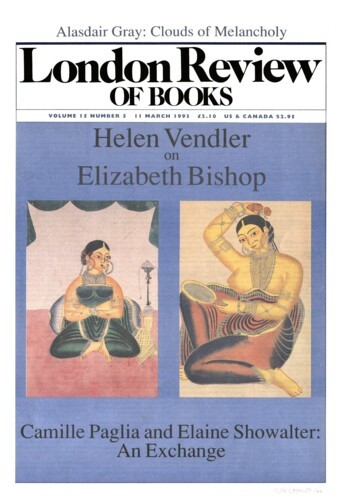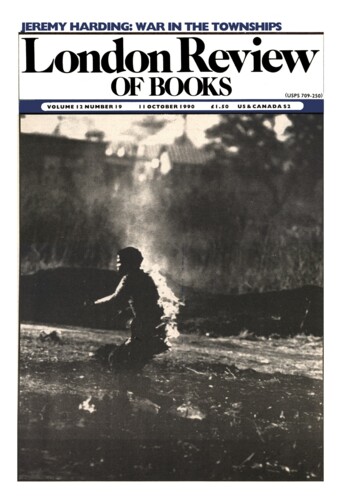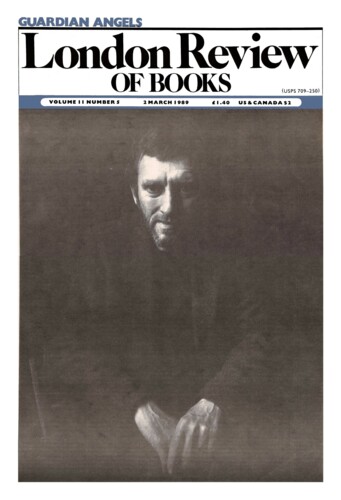Angus Calder
Angus Calder Revolutionary Empire: The Rise of the English-Speaking Empires from the 15th Century to the 1780s will be published in March. He is the author of The People’s War: Britain 1939-1945.
The Sadist
12 March 1992
God’s Own
Angus Calder, 12 March 1992
It is no surprise when you arrive in Harare, formerly Salisbury, and a taxi driver recommends the Courtney Hotel. After all, there is still a hotel named after Speke in Kampala, Uganda, and the New Stanley Hotel has remained a well-known establishment in Nairobi. But to discover that the Courtney is in Selous Avenue is more of a jolt It’s over a decade since Mugabe and his guerrillas in effect won the war to liberate Zimbabwe, but its capital’s street names are a bizarre mélange. North of Selous the next avenue is Livingstone; then comes Herbert Chitepo, named after an African leader martyred in the struggle. To the south, Baker and Speke intrude between Samora Machel and Mugabe. Since those two famous explorers never came anywhere near the territory formerly known as Southern Rhodesia, their continued invocation in the centre of decolonised Harare is remarkable testimony to the charisma attached to the myth of the doughty white man worming into the core of a dark continent.
Distaste for Leavis
11 October 1990
Enemies of Promise
Angus Calder, 2 March 1989
Just seventy years after Friday, 31 January 1919, when troops and tanks stood by to quell a mass rally, in Glasgow’s George Square, of West of Scotland workers campaigning for a forty-hour week, the event was remembered in the People’s Palace, the museum of labour history on Glasgow Green. A bronze bust of Willie Gallacher by Ian Walters was not so much unveiled as proclaimed. It sits at the top of the building, in the room where Ken Currie’s controversial Rivera-style murals of working-class history can be seen around the ceiling: but the speeches were made in the Winter Garden downstairs, where heavy rain dripping through the glass roof and a chill which gnawed one’s bowels did not dismay the two hundred people who had gathered to honour the man who from 1935 to 1950 was Honourable Member for West Fife (Comm.), and an activist long before that on the Clyde Workers Committee.
Pieces about Angus Calder in the LRB
The brief possibility of a different kind of history
Julian Symons, 12 September 1991
A myth now, what is that? ‘A purely fictitious narrative embodying some popular idea concerning natural or historical phenomena,’ my Shorter Oxford says, adding: ‘Often used...
Kiss Count
John Campbell, 19 April 1984
The spectacle of members of the upper class setting out solemnly and in a spirit of scientific research to study the lower classes in their natural habitat is a peculiarly Thirties phenomenon....
Freaks of Empire
V.G. Kiernan, 16 July 1981
‘Revolutionary empire’ is a bold term which may be taken in various senses. Like the Roman and Arab before it, but on a grander scale, the British Empire was a powerful force in...
Read anywhere with the London Review of Books app, available now from the App Store for Apple devices, Google Play for Android devices and Amazon for your Kindle Fire.
Sign up to our newsletter
For highlights from the latest issue, our archive and the blog, as well as news, events and exclusive promotions.




